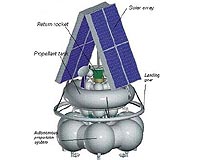 |
for LaunchSpace Bethesda MD (SPX) Dec 15, 2010 A new era in spaceflight opened last Wednesday with the successful first flight of Space Exploration Technologies' (SpaceX) Dragon capsule by a non-government entity. It demonstrated the ability to maneuver on orbit, deorbit, enter the atmosphere, deploy its parachutes, and be recovered intact. Had it had people on board, which it could have, with its rudimentary short-duration life support system, they would have had a "nice ride," according to SpaceX founder Elon Musk. That it didn't was due only to a lack of flight experience, and a launch escape system, yet to be developed, but which can be and almost certainly will be now, closing the "gap" during which we are reliant on the Russians for ISS access with the Shuttle retirement to as little as a couple years. Equally importantly, it demonstrated that the successful first flight of the new SpaceX Falcon 9 launcher in June was no fluke, with a perfect delivery of the capsule to orbit. SpaceX's commercial customers, such as Iridium, will have more confidence now in the system, and their numbers are now sure to grow. Had it occurred a day earlier, it would have done so on the thirty-eighth anniversary of the launch of the last human excursion to the moon. Space policy has been roiled all year by the misperception that the new NASA direction described in its 2011 budget request in late January had not only abandoned the space agency's goal of returning to the moon by 2020, but essentially ended the human spaceflight program. This false perception was often fed by people with other agendas, to preserve jobs in Utah, Alabama, Florida and Colorado. One of the most persistent criticisms of the new policy has been that relying on commercial companies for the delivery of NASA astronauts to orbit was "risky" and "uncertain," while ignoring the certainty that persisting with Ares I and Orion was going to be horrifically expensive and dramatically increase the dreaded "gap". The Augustine Panel pointed out over a year ago that the program was slipping more than a year per year, and that they would be available no sooner than 2017, and cost more than the Space Shuttle per flight. This criticism also ignored the highly successful record of the United Launch Alliance's (ULA) Atlas and Delta rockets, on which both NASA and the Department of Defense rely for the delivery of billion-dollar satellites. With Wednesday's apparently flawless flight, and continuing progress on other capsule concepts from Boeing and others, that criticism will be greatly muted now. Combined with the growing acceptance of ULA's concepts for orbital propellant depots based on Atlas and Delta launch technologies, which obviates the need for the heavy-lift vehicle demanded by Congress in its recent NASA authorization, it will be ever harder to justify continuing such expensive and unnecessary programs in the coming austere budget environment. The half-century-old paradigm of Apollo - a specific planetary goal, a gargantuan rocket, an unlimited budget - is finally dead. Replacing it is a more effective concept, for those who want to open up and develop the solar system, and not just send a few government-employee "explorers" at a cost of billions per flight - a robust and redundant space transportation infrastructure, with private competition and increasing activity driving down costs for all, and not just NASA. Those interested in getting up to speed on the issues and solutions for the future of human space flight should be interested in Launchspace's newest two-day course, no. 9015: New Approaches to Human Spaceflight Technology and Policy, in which they will be discussed in great detail. Watch for a public schedule announcement in the near future.
Share This Article With Planet Earth
Related Links LaunchSpace Space Analysis and Space OpEds
 Shipwrecks Of Mars
Shipwrecks Of MarsSydney, Australia (SPX) Aug 26, 2010 Mars exploration is preparing for another surge. NASA and the European Space Agency are pooling their resources for a powerful new set of missions later this decade, and next year, we will see the launch of NASA's Mars Science Laboratory rover, Russia's Phobos-Grunt mission, and China's Yinghuo orbiter. With several active missions currently exploring Mars, we've taken our attention away f ... read more |
|
| The content herein, unless otherwise known to be public domain, are Copyright 1995-2010 - SpaceDaily. AFP and UPI Wire Stories are copyright Agence France-Presse and United Press International. ESA Portal Reports are copyright European Space Agency. All NASA sourced material is public domain. Additional copyrights may apply in whole or part to other bona fide parties. Advertising does not imply endorsement,agreement or approval of any opinions, statements or information provided by SpaceDaily on any Web page published or hosted by SpaceDaily. Privacy Statement |